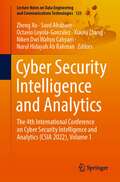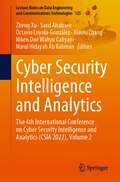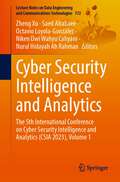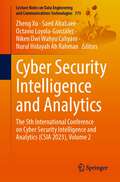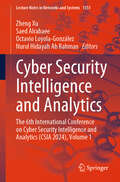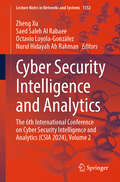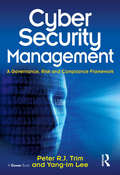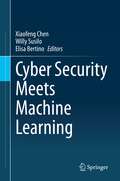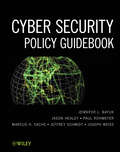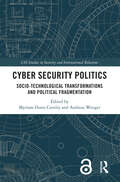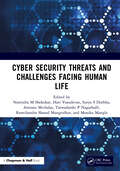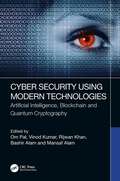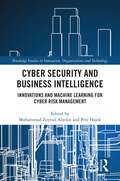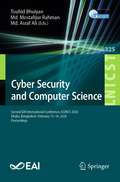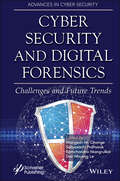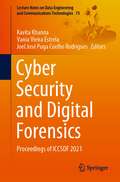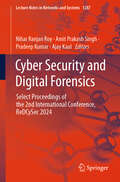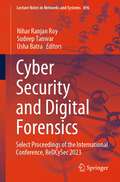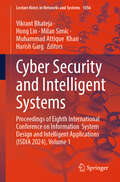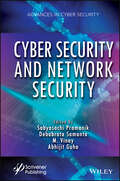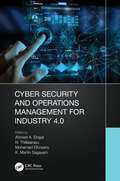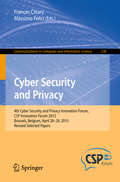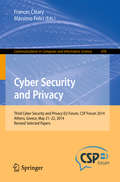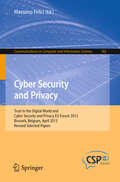- Table View
- List View
Cyber Security Intelligence and Analytics: The 4th International Conference on Cyber Security Intelligence and Analytics (CSIA 2022), Volume 1 (Lecture Notes on Data Engineering and Communications Technologies #123)
by Xiaolu Zhang Zheng Xu Saed Alrabaee Octavio Loyola-González Niken Dwi Wahyu Cahyani Nurul Hidayah Ab RahmanThis book presents the outcomes of the 2022 4th International Conference on Cyber Security Intelligence and Analytics (CSIA 2022), an international conference dedicated to promoting novel theoretical and applied research advances in the interdisciplinary field of cyber-security, particularly focusing on threat intelligence, analytics, and countering cyber-crime. The conference provides a forum for presenting and discussing innovative ideas, cutting-edge research findings and novel techniques, methods and applications on all aspects of cyber-security intelligence and analytics. Due to COVID-19, authors, keynote speakers and PC committees will attend the conference online.
Cyber Security Intelligence and Analytics: The 4th International Conference on Cyber Security Intelligence and Analytics (CSIA 2022), Volume 2 (Lecture Notes on Data Engineering and Communications Technologies #125)
by Xiaolu Zhang Zheng Xu Saed Alrabaee Octavio Loyola-González Niken Dwi Wahyu Cahyani Nurul Hidayah Ab RahmanThis book presents the outcomes of the 2022 4th International Conference on Cyber Security Intelligence and Analytics (CSIA 2022), an international conference dedicated to promoting novel theoretical and applied research advances in the interdisciplinary field of cyber-security, particularly focusing on threat intelligence, analytics, and countering cyber-crime. The conference provides a forum for presenting and discussing innovative ideas, cutting-edge research findings and novel techniques, methods and applications on all aspects of cyber-security intelligence and analytics. Due to COVID-19, authors, keynote speakers and PC committees will attend the conference online.
Cyber Security Intelligence and Analytics: The 5th International Conference on Cyber Security Intelligence and Analytics (CSIA 2023), Volume 1 (Lecture Notes on Data Engineering and Communications Technologies #172)
by Zheng Xu Saed Alrabaee Octavio Loyola-González Niken Dwi Wahyu Cahyani Nurul Hidayah Ab RahmanThis book provides the proceedings of the 5th International Conference on Cyber Security Intelligence and Analytics. The 5th International Conference on Cyber Security Intelligence and Analytics (CSIA 2023) is an international conference dedicated to promoting novel theoretical and applied research advances in the interdisciplinary agenda of cyber security, particularly focusing on threat intelligence and analytics and countering cybercrime. Cyber security experts, including those in data analytics, incident response and digital forensics, need to be able to rapidly detect, analyze and defend against a diverse range of cyber threats in near real-time conditions. We are organizing the CSIA 2023 at Radisson Blu Shanghai Pudong Jinqiao Hotel. It will feature a technical program of refereed papers selected by the international program committee, keynote address.
Cyber Security Intelligence and Analytics: The 5th International Conference on Cyber Security Intelligence and Analytics (CSIA 2023), Volume 2 (Lecture Notes on Data Engineering and Communications Technologies #173)
by Zheng Xu Saed Alrabaee Octavio Loyola-González Niken Dwi Wahyu Cahyani Nurul Hidayah Ab RahmanThis book provides the proceedings of the 5th International Conference on Cyber Security Intelligence and Analytics. The 5th International Conference on Cyber Security Intelligence and Analytics (CSIA 2023) is an international conference dedicated to promoting novel theoretical and applied research advances in the interdisciplinary agenda of cyber security, particularly focusing on threat intelligence and analytics and countering cybercrime. Cyber security experts, including those in data analytics, incident response and digital forensics, need to be able to rapidly detect, analyze and defend against a diverse range of cyber threats in near real-time conditions. We are organizing the CSIA 2023 at Radisson Blu Shanghai Pudong Jinqiao Hotel. It will feature a technical program of refereed papers selected by the international program committee, keynote address.
Cyber Security Intelligence and Analytics: The 6th International Conference on Cyber Security Intelligence and Analytics (CSIA 2024), Volume 1 (Lecture Notes in Networks and Systems #1351)
by Zheng Xu Saed Alrabaee Octavio Loyola-González Nurul Hidayah Ab RahmanThis book delves into the latest advancements and innovations in big data analytics as applied to cyber-physical systems within smart city frameworks. Key themes include the integration of IoT, AI, and machine learning for enhanced urban management, sustainable development, and improved quality of life. The book showcases cutting-edge research, practical case studies, and expert insights, making it an invaluable resource for understanding the transformative potential of big data in creating smarter, more connected cities. Don't miss out on this authoritative guide to the future of smart city analytics
Cyber Security Intelligence and Analytics: The 6th International Conference on Cyber Security Intelligence and Analytics (CSIA 2024), Volume 2 (Lecture Notes in Networks and Systems #1352)
by Zheng Xu Octavio Loyola-González Nurul Hidayah Ab Rahman Saed Saleh Al RabaeeThis book delves into the latest advancements and innovations in big data analytics as applied to cyber-physical systems within smart city frameworks. Key themes include the integration of IoT, AI, and machine learning for enhanced urban management, sustainable development, and improved quality of life. The book showcases cutting-edge research, practical case studies, and expert insights, making it an invaluable resource for understanding the transformative potential of big data in creating smarter, more connected cities. Don't miss out on this authoritative guide to the future of smart city analytics
Cyber Security Management: A Governance, Risk and Compliance Framework
by Peter Trim Yang-Im LeeCyber Security Management: A Governance, Risk and Compliance Framework by Peter Trim and Yang-Im Lee has been written for a wide audience. Derived from research, it places security management in a holistic context and outlines how the strategic marketing approach can be used to underpin cyber security in partnership arrangements. The book is unique because it integrates material that is of a highly specialized nature but which can be interpreted by those with a non-specialist background in the area. Indeed, those with a limited knowledge of cyber security will be able to develop a comprehensive understanding of the subject and will be guided into devising and implementing relevant policy, systems and procedures that make the organization better able to withstand the increasingly sophisticated forms of cyber attack. The book includes a sequence-of-events model; an organizational governance framework; a business continuity management planning framework; a multi-cultural communication model; a cyber security management model and strategic management framework; an integrated governance mechanism; an integrated resilience management model; an integrated management model and system; a communication risk management strategy; and recommendations for counteracting a range of cyber threats. Cyber Security Management: A Governance, Risk and Compliance Framework simplifies complex material and provides a multi-disciplinary perspective and an explanation and interpretation of how managers can manage cyber threats in a pro-active manner and work towards counteracting cyber threats both now and in the future.
Cyber Security Meets Machine Learning
by Elisa Bertino Xiaofeng Chen Willy SusiloMachine learning boosts the capabilities of security solutions in the modern cyber environment. However, there are also security concerns associated with machine learning models and approaches: the vulnerability of machine learning models to adversarial attacks is a fatal flaw in the artificial intelligence technologies, and the privacy of the data used in the training and testing periods is also causing increasing concern among users. This book reviews the latest research in the area, including effective applications of machine learning methods in cybersecurity solutions and the urgent security risks related to the machine learning models. The book is divided into three parts: Cyber Security Based on Machine Learning; Security in Machine Learning Methods and Systems; and Security and Privacy in Outsourced Machine Learning. Addressing hot topics in cybersecurity and written by leading researchers in the field, the book features self-contained chapters to allow readers to select topics that are relevant to their needs. It is a valuable resource for all those interested in cybersecurity and robust machine learning, including graduate students and academic and industrial researchers, wanting to gain insights into cutting-edge research topics, as well as related tools and inspiring innovations.
Cyber Security Policy Guidebook
by Joseph Weiss Jennifer L. Bayuk Jason Healey Paul Rohmeyer Marcus H. Sachs Jeffrey SchmidtDrawing upon a wealth of experience from academia, industry, and government service, Cyber Security Policy Guidebook details and dissects, in simple language, current organizational cyber security policy issues on a global scale--taking great care to educate readers on the history and current approaches to the security of cyberspace. It includes thorough descriptions--as well as the pros and cons--of a plethora of issues, and documents policy alternatives for the sake of clarity with respect to policy alone. The Guidebook also delves into organizational implementation issues, and equips readers with descriptions of the positive and negative impact of specific policy choices. Inside are detailed chapters that: Explain what is meant by cyber security and cyber security policy Discuss the process by which cyber security policy goals are set Educate the reader on decision-making processes related to cyber security Describe a new framework and taxonomy for explaining cyber security policy issues Show how the U. S. government is dealing with cyber security policy issues With a glossary that puts cyber security language in layman's terms--and diagrams that help explain complex topics--Cyber Security Policy Guidebook gives students, scholars, and technical decision-makers the necessary knowledge to make informed decisions on cyber security policy.
Cyber Security Politics: Socio-Technological Transformations and Political Fragmentation (CSS Studies in Security and International Relations)
by Myriam Dunn Cavelty and Andreas WengerThis book examines new and challenging political aspects of cyber security and presents it as an issue defined by socio-technological uncertainty and political fragmentation. Structured along two broad themes and providing empirical examples for how socio-technical changes and political responses interact, the first part of the book looks at the current use of cyber space in conflictual settings, while the second focuses on political responses by state and non-state actors in an environment defined by uncertainties. Within this, it highlights four key debates that encapsulate the complexities and paradoxes of cyber security politics from a Western perspective – how much political influence states can achieve via cyber operations and what context factors condition the (limited) strategic utility of such operations; the role of emerging digital technologies and how the dynamics of the tech innovation process reinforce the fragmentation of the governance space; how states attempt to uphold stability in cyberspace and, more generally, in their strategic relations; and how the shared responsibility of state, economy, and society for cyber security continues to be re-negotiated in an increasingly trans-sectoral and transnational governance space. This book will be of much interest to students of cyber security, global governance, technology studies, and international relations.
Cyber Security Threats and Challenges Facing Human Life
by Hari Vasudevan Antonis Michalas Monika Mangla Ramchandra Sharad Mangrulkar Narendra M Shekokar Surya S Durbha Tatwadarshi P NagarhalliCyber Security Threats and Challenges Facing Human Life provides a comprehensive view of the issues, threats, and challenges that are faced in the cyber security domain. This book offers detailed analysis of effective countermeasures and mitigations. The financial sector, healthcare, digital manufacturing, and social media are some of the important areas in which cyber-attacks are frequent and cause great harm. Hence, special emphasis is given to the study and analysis of cyber security challenges and countermeasures in those four important areas. KEY FEATURES • Discusses the prominence of cyber security in human life • Discusses the significance of cyber security in the post-COVID-19 world • Emphasizes the issues, challenges, and applications of cyber security mitigation methods in business and different sectors • Provides comphrension of the impact of cyber security threats and challenges in digital manufacturing and the internet of things environment • Offers understanding of the impact of big data breaches and future trends in data security This book is primarily aimed at undergraduate students, graduate students, researchers, academicians, and professionals who are interested in exploring their research and knowledge in cyber security domain.
Cyber Security Using Modern Technologies: Artificial Intelligence, Blockchain and Quantum Cryptography
by Vinod Kumar Mansaf Alam Om Pal Rijwan Khan Bashir AlamThe main objective of this book is to introduce cyber security using modern technologies such as Artificial Intelligence, Quantum Cryptography, and Blockchain. This book provides in-depth coverage of important concepts related to cyber security. Beginning with an introduction to Quantum Computing, Post-Quantum Digital Signatures, and Artificial Intelligence for cyber security of modern networks and covering various cyber-attacks and the defense measures, strategies, and techniques that need to be followed to combat them, this book goes on to explore several crucial topics, such as security of advanced metering infrastructure in smart grids, key management protocols, network forensics, intrusion detection using machine learning, cloud computing security risk assessment models and frameworks, cyber-physical energy systems security, a biometric random key generator using deep neural network and encrypted network traffic classification. In addition, this book provides new techniques to handle modern threats with more intelligence. It also includes some modern techniques for cyber security, such as blockchain for modern security, quantum cryptography, and forensic tools. Also, it provides a comprehensive survey of cutting-edge research on the cyber security of modern networks, giving the reader a general overview of the field. It also provides interdisciplinary solutions to protect modern networks from any type of attack or manipulation. The new protocols discussed in this book thoroughly examine the constraints of networks, including computation, communication, and storage cost constraints, and verifies the protocols both theoretically and experimentally. Written in a clear and comprehensive manner, this book would prove extremely helpful to readers. This unique and comprehensive solution for the cyber security of modern networks will greatly benefit researchers, graduate students, and engineers in the fields of cryptography and network security.
Cyber Security and Business Intelligence: Innovations and Machine Learning for Cyber Risk Management (Routledge Studies in Innovation, Organizations and Technology)
by Petr Hajek Mohammad Zoynul AbedinTo cope with the competitive worldwide marketplace, organizations rely on business intelligence to an increasing extent. Cyber security is an inevitable practice to protect the entire business sector and its customer. This book presents the significance and application of cyber security for safeguarding organizations, individuals’ personal information, and government. The book provides both practical and managerial implications of cyber security that also supports business intelligence and discusses the latest innovations in cyber security. It offers a roadmap to master degree students and PhD researchers for cyber security analysis in order to minimize the cyber security risk and protect customers from cyber-attack. The book also introduces the most advanced and novel machine learning techniques including, but not limited to, Support Vector Machine, Neural Networks, Extreme Learning Machine, Ensemble Learning, and Deep Learning Approaches, with a goal to apply those to cyber risk management datasets. It will also leverage real-world financial instances to practise business product modelling and data analysis. The contents of this book will be useful for a wide audience who are involved in managing network systems, data security, data forecasting, cyber risk modelling, fraudulent credit risk detection, portfolio management, and data regulatory bodies. It will be particularly beneficial to academics as well as practitioners who are looking to protect their IT system, and reduce data breaches and cyber-attack vulnerabilities.
Cyber Security and Business Intelligence: Innovations and Machine Learning for Cyber Risk Management (Routledge Studies in Innovation, Organizations and Technology)
by Petr Hajek Mohammad Zoynul AbedinTo cope with the competitive worldwide marketplace, organizations rely on business intelligence to an increasing extent. Cyber security is an inevitable practice to protect the entire business sector and its customer. This book presents the significance and application of cyber security for safeguarding organizations, individuals’ personal information, and government.The book provides both practical and managerial implications of cyber security that also supports business intelligence and discusses the latest innovations in cyber security. It offers a roadmap to master degree students and PhD researchers for cyber security analysis in order to minimize the cyber security risk and protect customers from cyber-attack. The book also introduces the most advanced and novel machine learning techniques including, but not limited to, Support Vector Machine, Neural Networks, Extreme Learning Machine, Ensemble Learning, and Deep Learning Approaches, with a goal to apply those to cyber risk management datasets. It will also leverage real-world financial instances to practise business product modelling and data analysis.The contents of this book will be useful for a wide audience who are involved in managing network systems, data security, data forecasting, cyber risk modelling, fraudulent credit risk detection, portfolio management, and data regulatory bodies. It will be particularly beneficial to academics as well as practitioners who are looking to protect their IT system, and reduce data breaches and cyber-attack vulnerabilities.
Cyber Security and Computer Science: Second EAI International Conference, ICONCS 2020, Dhaka, Bangladesh, February 15-16, 2020, Proceedings (Lecture Notes of the Institute for Computer Sciences, Social Informatics and Telecommunications Engineering #325)
by Touhid Bhuiyan Md. Mostafijur Rahman Md. Asraf AliThis book constitutes the refereed post-conference proceedings of the Second International Conference on Cyber Security and Computer Science, ICONCS 2020, held in Dhaka, Bangladesh, in February 2020. The 58 full papers were carefully reviewed and selected from 133 submissions. The papers detail new ideas, inventions, and application experiences to cyber security systems. They are organized in topical sections on optimization problems; image steganography and risk analysis on web applications; machine learning in disease diagnosis and monitoring; computer vision and image processing in health care; text and speech processing; machine learning in health care; blockchain applications; computer vision and image processing in health care; malware analysis; computer vision; future technology applications; computer networks; machine learning on imbalanced data; computer security; Bangla language processing.
Cyber Security and Digital Forensics (Advances in Cyber Security)
by Dac-Nhuong Le Sabyasachi Pramanik Ramchandra Mangrulkar Mangesh M. GhongeCYBER SECURITY AND DIGITAL FORENSICS Cyber security is an incredibly important issue that is constantly changing, with new methods, processes, and technologies coming online all the time. Books like this are invaluable to professionals working in this area, to stay abreast of all of these changes. Current cyber threats are getting more complicated and advanced with the rapid evolution of adversarial techniques. Networked computing and portable electronic devices have broadened the role of digital forensics beyond traditional investigations into computer crime. The overall increase in the use of computers as a way of storing and retrieving high-security information requires appropriate security measures to protect the entire computing and communication scenario worldwide. Further, with the introduction of the internet and its underlying technology, facets of information security are becoming a primary concern to protect networks and cyber infrastructures from various threats. This groundbreaking new volume, written and edited by a wide range of professionals in this area, covers broad technical and socio-economic perspectives for the utilization of information and communication technologies and the development of practical solutions in cyber security and digital forensics. Not just for the professional working in the field, but also for the student or academic on the university level, this is a must-have for any library. Audience: Practitioners, consultants, engineers, academics, and other professionals working in the areas of cyber analysis, cyber security, homeland security, national defense, the protection of national critical infrastructures, cyber-crime, cyber vulnerabilities, cyber-attacks related to network systems, cyber threat reduction planning, and those who provide leadership in cyber security management both in public and private sectors
Cyber Security and Digital Forensics: Proceedings of ICCSDF 2021 (Lecture Notes on Data Engineering and Communications Technologies #73)
by Vania Vieira Estrela Kavita Khanna Joel José Puga Coelho RodriguesThis book features high-quality research papers presented at the International Conference on Applications and Techniques in Cyber Security and Digital Forensics (ICCSDF 2021), held at The NorthCap University, Gurugram, Haryana, India, during April 3–4, 2021. This book discusses the topics ranging from information security to cryptography, mobile application attacks to digital forensics, and from cyber security to blockchain. The goal of the book is to provide 360-degree view of cybersecurity to the readers which include cyber security issues, threats, vulnerabilities, novel idea, latest technique and technology, and mitigation of threats and attacks along with demonstration of practical applications. This book also highlights the latest development, challenges, methodologies as well as other emerging areas in this field. It brings current understanding of common Web vulnerabilities while maintaining awareness and knowledge of contemporary standards, practices, procedures, and methods of Open Web Application Security Project. It also expounds how to recover information after a cybercrime.
Cyber Security and Digital Forensics: Select Proceedings of the 2nd International Conference, ReDCySec 2024 (Lecture Notes in Networks and Systems #1287)
by Pradeep Kumar Nihar Ranjan Roy Amit Prakash Singh Ajay KaulThis book features peer-reviewed papers from the International Conference on Recent Developments in Cyber Security, organized by the Center for Cyber Security and Cryptology. It focuses on key topics such as information privacy and secrecy, cryptography, cyber threat intelligence and mitigation, cyber-physical systems, quantum cryptography, and blockchain technologies and their applications. This volume is a unique collection of chapters from various disciplines united by a common theme, making it immensely valuable for both academic researchers and industry practitioners.
Cyber Security and Digital Forensics: Select Proceedings of the International Conference, ReDCySec 2023 (Lecture Notes in Networks and Systems #896)
by Usha Batra Nihar Ranjan Roy Sudeep TanwarThe book contains peer-reviewed papers from the International Conference on Recent Developments in Cyber Security organized by the Center for Cyber Security and Cryptology at Sharda University in June 2023. This volume focuses on privacy and secrecy of information, cryptography, applications and analysis, cyber threat intelligence and mitigation, cyber-physical systems, cyber threat intelligence, quantum cryptography and blockchain technologies and their application, etc. This book is a unique collection of chapters from different areas with a common theme and will be immensely useful to academic researchers and practitioners in the industry.
Cyber Security and Intelligent Systems: Proceedings of Eighth International Conference on Information System Design and Intelligent Applications (ISDIA 2024), Volume 1 (Lecture Notes in Networks and Systems #1056)
by Vikrant Bhateja Hong Lin Harish Garg Milan Simic Muhammad Attique KhanThis book presents a collection of high-quality, peer-reviewed research papers from the 8th International Conference on Information System Design and Intelligent Applications (ISDIA 2024), held in Dubai, UAE, from 3-4 January 2024. It covers a wide range of topics in computer science and information technology, including data mining and data warehousing, high-performance computing, parallel and distributed computing, computational intelligence, soft computing, big data, cloud computing, grid computing, cognitive computing, and information security.
Cyber Security and Network Security (Advances in Cyber Security)
by Abhijit Guha Debabrata Samanta Sabyasachi Pramanik M. VinayCYBER SECUTIRY AND NETWORK SECURITY Written and edited by a team of experts in the field, this is the most comprehensive and up-to-date study of the practical applications of cyber security and network security for engineers, scientists, students, and other professionals. Digital assaults are quickly becoming one of the most predominant issues on the planet. As digital wrongdoing keeps on expanding, it is increasingly more important to investigate new methodologies and advances that help guarantee the security of online networks. Ongoing advances and innovations have made great advances for taking care of security issues in a methodical manner. In light of this, organized security innovations have been delivered so as to guarantee the security of programming and correspondence functionalities at fundamental, improved, and engineering levels. This outstanding new volume covers all of the latest advances, innovations, and developments in practical applications for cybersecurity and network security. This team of editors represents some of the most well-known and respected experts in the area, creating this comprehensive, up-to-date coverage of the issues of the day and state of the art. Whether for the veteran engineer or scientist or a student, this volume is a must-have for any library.
Cyber Security and Operations Management for Industry 4.0
by Ahmed A ElngarThis book seamlessly connects the topics of Industry 4.0 and cyber security. It discusses the risks and solutions of using cyber security techniques for Industry 4.0.Cyber Security and Operations Management for Industry 4.0 covers the cyber security risks involved in the integration of Industry 4.0 into businesses and highlights the issues and solutions. The book offers the latest theoretical and practical research in the management of cyber security issues common in Industry 4.0 and also discusses the ethical and legal perspectives of incorporating cyber security techniques and applications into the day-to-day functions of an organization. Industrial management topics related to smart factories, operations research, and value chains are also discussed.This book is ideal for industry professionals, researchers, and those in academia who are interested in learning more about how cyber security and Industry 4.0 are related and can work together.
Cyber Security and Privacy: 4th Cyber Security and Privacy Innovation Forum, CSP Innovation Forum 2015, Brussels, Belgium April 28-29, 2015, Revised Selected Papers (Communications in Computer and Information Science #530)
by Massimo Felici Frances ClearyThis book constitutes the thoroughly refereed selected papers on the 4th Cyber Security and Privacy Innovation Forum, CSP Forum 2015, held in Brussels, Belgium, in April 2015. The 12 revised full papers presented were carefully reviewed and selected from various submissions. The papers are organized in topical sections such as security and privacy in the cloud; security and privacy technologies; risk and trust; research and innovation in cyber security and privacy.
Cyber Security and Privacy: Third Cyber Security and Privacy EU Forum, CSP Forum 2014, Athens, Greece, May 21-22, 2014, Revised Selected Papers (Communications in Computer and Information Science #470)
by Massimo Felici Frances ClearyThis book constitutes the thoroughly refereed selected papers on the 4th Cyber Security and Privacy Innovation Forum, CSP Forum 2015, held in Brussels, Belgium, in April 2015. The 12 revised full papers presented were carefully reviewed and selected from various submissions. The papers are organized in topical sections such as security and privacy in the cloud; security and privacy technologies; risk and trust; research and innovation in cyber security and privacy.
Cyber Security and Privacy: Trust in the Digital World and Cyber Security and Privacy EU Forum 2013, Brussels, Belgium, April 2013, Revised Selected Papers (Communications in Computer and Information Science #182)
by Massimo FeliciThis book constitutes the thoroughly refereed, selected papers on Cyber Security and Privacy EU Forum 2013, held in Belgium, in April 2013. The 14 revised full papers presented were carefully reviewed and selected from various submissions. The papers are organized in topical sections on cloud computing, security and privacy management, security and privacy technology, security and privacy policy.
